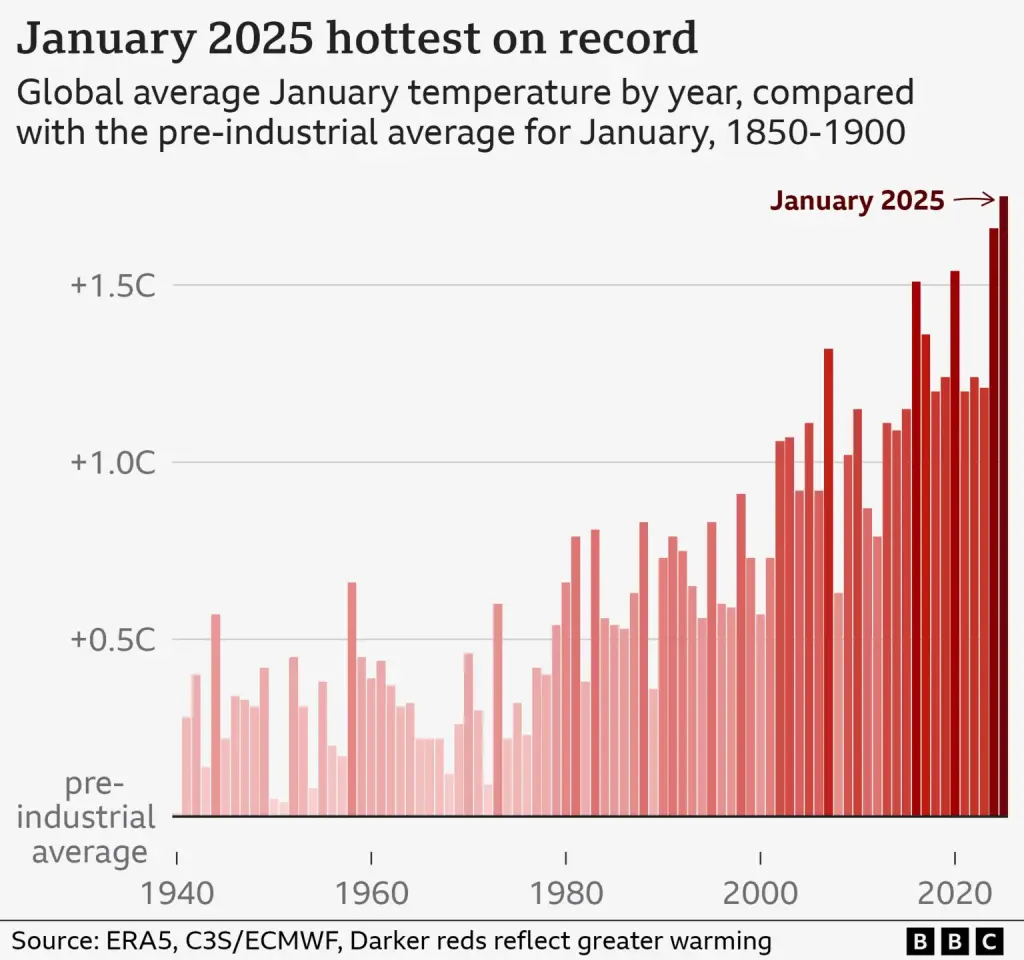The planet is heating up—fast! January 2025 has shattered all previous records, becoming the hottest January in history. Scientists are baffled. They expected cooler temperatures after El Niño faded. Instead, global heat soared higher than ever before!
A shocking temperature spike
Experts predicted a slight cooldown compared to January 2024. Why? A shift away from El Niño, the natural Pacific weather pattern that typically raises global temperatures. But instead of cooling down, the world sizzled! According to the European Copernicus Climate Service, last month beat the previous record by a shocking 0.1°C.
Why is this happening?
Scientists blame greenhouse gases from human activities—mainly fossil fuels. But this recent heatwave is more extreme than they expected. The temperature spike has left researchers scrambling for answers.
NASA climate expert Gavin Schmidt explained: “We know why the world is warming—greenhouse gases. But the intensity of these recent records? That’s still a mystery.”
Since mid-2023, global heat has been consistently 0.2°C above expectations. January 2025 was a scorching 1.75°C hotter than the late 19th-century average. The planet is warming faster than ever!
El Niño’s lingering effect?
Early last year, El Niño drove up global temperatures. This year, its opposite—La Niña—is forming. Normally, La Niña cools things down. But January didn’t cool at all. Experts at the UK Met Office expected a drop. Instead, temperatures stayed sky-high.
“If you’d asked me a few months ago, I’d have said January 2025 would be cooler,” admitted Adam Scaife, a top climate forecaster. “We were wrong. And we don’t know why.”
Some scientists think the 2023-24 El Niño might still be influencing the climate. It followed an unusually long La Niña phase from 2020 to 2023. Could it have “unlocked” hidden ocean heat? Maybe. But if that were true, its effects should be fading by now. They aren’t.

Oceans changing the game?
Another alarming clue: unusual ocean warmth across the globe. According to Copernicus expert Samantha Burgess, the oceans are behaving strangely. Warmer waters directly impact air temperatures. Scientists are closely watching sea temperature trends.
Vanishing aerosols: A hidden danger?
Some researchers have a different theory—fewer aerosols in the air. These tiny particles help form bright clouds, which reflect sunlight and cool the Earth. But thanks to cleaner air regulations, especially in shipping and China, fewer aerosols are now present. That means less cooling to counteract greenhouse gases.
Legendary climate scientist James Hansen suggests this aerosol effect was underestimated. If true, climate change could be even worse than feared!
The worst-case scenario?
Some experts fear an even darker possibility—a cloud feedback disaster. If warming oceans destroy low-level reflective clouds, the planet could heat up even faster. Right now, it’s just a theory. But the coming months will reveal whether this terrifying scenario is unfolding.
Most scientists still hope 2025 will end up slightly cooler than 2023 and 2024. But after this shocking January, they can’t be sure.
One thing is certain: more records will break unless humanity stops pumping greenhouse gases into the atmosphere.
“In the future, 2025 might actually be one of the cooler years,” warned Dr. Burgess. “Unless we turn off the tap on emissions, temperatures will keep rising.”